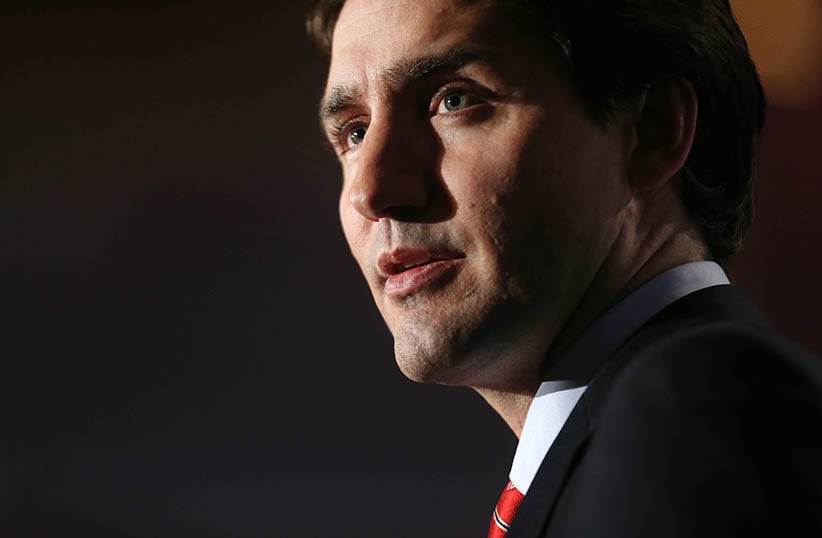The centre-left’s divine right: The arrogance of Justin Trudeau’s Liberals
Peter C. Newman on how the Liberals’ current leadership is just the latest to believe it is owed power
Liberal Leader Justin Trudeau (right) and former prime minister Jean Chretien stand together on stage at an event to celebrate the 50th Anniversary of the Canadian Flag, in Mississauga Ont., on Sunday February 15 2015.THE CANADIAN PRESS/Chris Young
Share

The Liberal party’s operational code has always been in simplicity itself: to govern Canada by striking the most marketable balance between elitism and egalitarianism. They labelled it the New Liberalism, and pretended that anybody called Trudeau could win.
Not bloody likely, it turns out.
In his jolting run for Grit Heaven, the Trudeau named Justin has been campaigning and getting into hot water by promising as little as possible but as much as necessary. Young Justin’s evolving platform treats voters as commodities to be harvested—like having the concession for blow-up balloons at a county fair.
His tendency to swing between political immaturity and ideological laissez-faire hasn’t caught on, because it’s based solely on his current situation of waiting impatiently to take his turn in power—without earning it. That only worked in a two-party system, never with three. In 2011, the Grits were pushed, for the first time ever, into political purgatory, where the also-runners shudder and hide, pretending that a recount might be in the cards. The youthful Trudeau has had to fall back on his inherited tendency to see himself as a natural heir of the haughty attitudes that once characterized the divine right of kings, especially Mackenzie Kings.
His campaign has been a backward march. Liberals still harbour the petulant assumption that they alone know what’s good for Canadians, and that it’s just plain dumb to vote for any other party—except as occasional comic relief. It’s comic relief, all right, but at the expense of what used to be called the Government Party.
I first became aware of their institutionalized arrogance when, as an Ottawa columnist for Maclean’s, I found myself researching a profile of Jack Pickersgill, then a senior Liberal minister in the Pearson government. “It is not merely for the well-being of Canadians, but for the good of mankind in general, that the present Liberal government should remain in office,” Pickersgill told me with a straight face. He had been a history major at Oxford, and I naively thought some book learnin’ might have rubbed off on him. It was not to be. Just like Justin, he viewed the Liberal party not as an organ of the people, but as an organ of state. Like it or not, Justin is heir to the hothouse attitude that, by accepting the burdens of office, Canada’s Liberals are bestowing a welcome benefaction on the nation at large.
That was the formula for Liberal longevity, and still is. Arrogance is as arrogance does. That was certainly true for the Liberal party under Louis St. Laurent, Mike Pearson, Jean Chrétien and Paul Martin—and particularly so under Pierre Trudeau—but also an integral part of young Justin’s inherited catechism. Familiarity ought to breed consent, and the advent of a new leadership should not, as the British essayist Havelock Ellis once complained, “merely be the exchange of one nuisance for another.” Canada’s most serious dilemma during the extended terms of Liberal dominance was not the calamitous state of our health care system, not the tragic joke called our Armed Forces, not our uneven, counterproductive tax structure, nor the insanely high price of freestanding housing. It was the growing and almost universal disbelief among Canadians that anything of substance—permanently beneficial—could be achieved through political manoeuvring.
That has been the deadly legacy of Liberal regimes. They would never admit to even considering such heresy, but their previous near-monopoly of federal power eventually undermined the efficacy of the democratic system. It was this subliminal threat that originally allowed Stephen Harper to seize power.
The big shift by the NDP was establishing its capacity to field French and English MPs with grace and substance in the House of Commons. That makes them the players to beat. The Orange Army originally attracted to the NDP’s coattails as a lark hung in, and is now dug in. Great expectations to the contrary, I once described Tom Mulcair—when he was still sporting that originally straggly beard—as looking like the kind of intimidating presence mothers hired to ensure the kids finished their spinach. I badly underestimated him, just as I badly overestimated how much of Harper’s clout was disposable. His ruthless manner leaves little doubt about the rumour being true that his cabinet ministers have to ask permission to sneeze. He is not a leader; he is a drill sergeant.
Justin’s most politically damaging decision was to publicly fire from his caucus all the senators and party veterans. They demanded nothing more than reassurance that their presence still counted for something. By cutting them off, Trudeau deprived himself of useful wisdom and freely available loyalties.
It was as if the once unbeatable Liberals were allowing themselves to be guided deeper into the political wilderness, led by a name instead of a leader. A good argument can be made that Justin Trudeau was an agent of change. A better argument can be made that he will be its first victim.